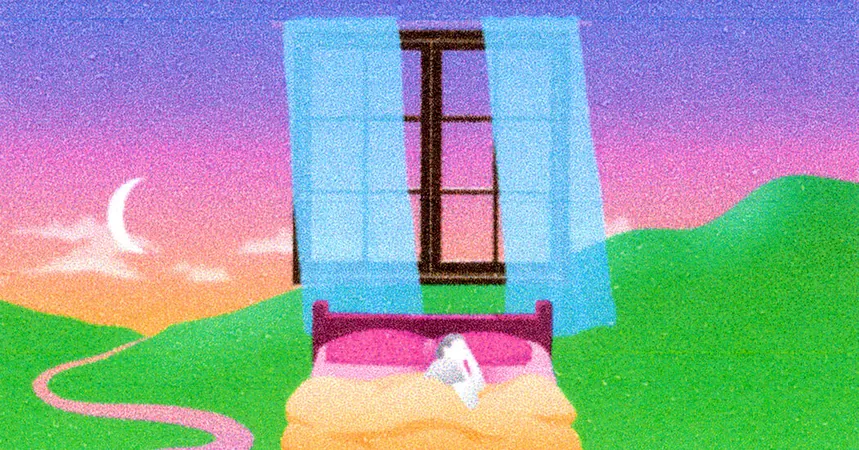
6 Common Misconceptions About Sleep You Need to Stop Believing Now!
2025-01-23
Author: Chun
Sleep is a cornerstone of good health, and it's something we all know we need more of. However, many of us are misguided about the ins and outs of achieving a restful night. From crippling fatigue to serious health risks like dementia and Type 2 diabetes, the consequences of sleep deprivation can be severe. Yet, despite our best efforts—whether it's trying out trendy “sleepy girl mocktails” or investing in complex bedtime routines—most of these approaches don’t tackle the core elements of sleep hygiene, as highlighted by sleep experts.
Researchers, including Rebecca Robbins from Harvard Medical School, emphasize that there are significant misunderstandings when it comes to sleep, warranting a re-evaluation of what we think we know. So, let’s clear the air about some persistent myths.
Myth 1: You Can Train Your Body to Need Less Sleep
Many believe they can adjust to long-term sleep deprivation, but that’s a dangerous illusion. Neurologist Dr. Ian Katznelson notes that while strategies like caffeine consumption may help, they don’t negate the risks associated with insufficient sleep. Long-term consequences include impaired memory, erratic moods, and a decline in creativity. Embrace the truth: your body cannot truly "adapt" to less sleep without facing health repercussions.
Myth 2: More Sleep is Always Better
While it's true that consistent, quality sleep is vital, oversleeping can also lead to health risks. A 2023 study revealed that adults sleeping more than nine hours daily increased their likelihood of dying from respiratory diseases by 35%. Confusion reigns, as it’s unclear whether excessive sleep is a cause or a symptom of health issues, according to expert Dr. Fariha Abbasi-Feinberg. For optimal health, aim for seven to nine hours each night.
Myth 3: Weekend Lay-Ins Can Compensate for Lost Sleep
The dreaded "sleep debt" is real! Sleeping in for a few extra hours on weekends can feel satisfying, but if you find yourself catching up on sleep for hours, it’s a clear sign you’re not getting enough during the week, warns Dr. Thomas Kilkenny. It’s essential to listen to your body and gradually adjust your sleep schedule during the week to avoid a cycle of sleep debt.
Myth 4: Waking Up at Night Indicates Poor Sleep Quality
If you often wake at 3 a.m., don’t panic! Dr. Jennifer Goldschmied reassures that brief awakenings are normal as our bodies cycle through different stages of sleep. Ideally, if you can’t fall back asleep after 20 minutes, it’s wise to get out of bed and engage in a relaxing activity until you feel sleepy again.
Myth 5: Feeling Groggy is Always a Problem
We’ve all been there—waking up feeling like a zombie after an afternoon nap. This state is known as sleep inertia, and a little grogginess is not necessarily harmful. According to the CDC, this feeling can last anywhere from 30 minutes to two hours. If it lingers or affects your daily life, though, consulting a sleep expert might be wise.
Myth 6: Snoring is Just Annoying, Not Dangerous
If you—or someone in your household—snore frequently, it might not be harmless. Dr. Mehwish Sajid points out that loud, disruptive snoring could signal obstructive sleep apnea, which can pose serious health risks. If you experience symptoms like choking or gasping during sleep, it’s imperative to seek medical advice.
In conclusion, understanding the truths about sleep can greatly improve your overall health and well-being. If you find your sleep habits troubling or are experiencing persistent issues, don’t hesitate to consult a sleep specialist. Prioritize your sleep—after all, it’s not just a luxury; it’s a necessity!

 Brasil (PT)
Brasil (PT)
 Canada (EN)
Canada (EN)
 Chile (ES)
Chile (ES)
 Česko (CS)
Česko (CS)
 대한민국 (KO)
대한민국 (KO)
 España (ES)
España (ES)
 France (FR)
France (FR)
 Hong Kong (EN)
Hong Kong (EN)
 Italia (IT)
Italia (IT)
 日本 (JA)
日本 (JA)
 Magyarország (HU)
Magyarország (HU)
 Norge (NO)
Norge (NO)
 Polska (PL)
Polska (PL)
 Schweiz (DE)
Schweiz (DE)
 Singapore (EN)
Singapore (EN)
 Sverige (SV)
Sverige (SV)
 Suomi (FI)
Suomi (FI)
 Türkiye (TR)
Türkiye (TR)
 الإمارات العربية المتحدة (AR)
الإمارات العربية المتحدة (AR)